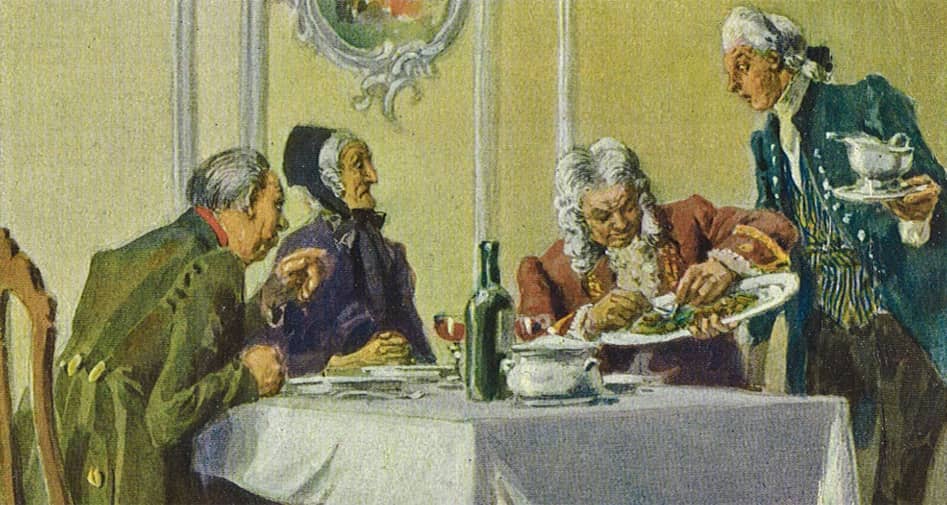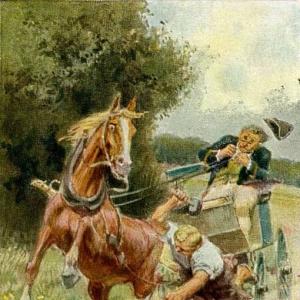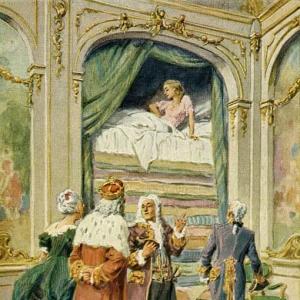Reading time: 7 min
There was once on a time a poor peasant called Crabb, who drove with two oxen a load of wood to the town, and sold it to a doctor for two thalers. When the money was being counted out to him, it so happened that the doctor was sitting at table, and when the peasant saw how daintily he ate and drank, his heart desired what he saw, and he would willingly have been a doctor too. So he remained standing a while, and at length inquired if he too could not be a doctor. „Oh, yes,“ said the doctor, „that is soon managed.“ – „What must I do?“ asked the peasant. „In the first place buy thyself an A B C book of the kind which has a cock on the frontispiece: in the second, turn thy cart and thy two oxen into money, and get thyself some clothes, and whatsoever else pertains to medicine; thirdly, have a sign painted for thyself with the words, „I am Doctor Knowall,“ and have that nailed up above thy house-door.“ The peasant did everything that he had been told to do. When he had doctored people awhile, but not long, a rich and great lord had some money stolen. Then he was told about Doctor Knowall who lived in such and such a village, and must know what had become of the money. So the lord had the horses put in his carriage, drove out to the village, and asked Crabb if he were Doctor Knowall? Yes, he was, he said. Then he was to go with him and bring back the stolen money. „Oh, yes, but Grethe, my wife, must go too.“ The lord was willing and let both of them have a seat in the carriage, and they all drove away together. When they came to the nobleman’s castle, the table was spread, and Crabb was told to sit down and eat. „Yes, but my wife, Grethe, too,“ said he, and he seated himself with her at the table. And when the first servant came with a dish of delicate fare, the peasant nudged his wife, and said, „Grethe, that was the first,“ meaning that was the servant who brought the first dish. The servant, however, thought he intended by that to say, „That is the first thief,“ and as he actually was so, he was terrified, and said to his comrade outside, „The doctor knows all: we shall fare ill, he said I was the first.“ The second did not want to go in at all, but was forced. So when he went in with his dish, the peasant nudged his wife, and said, „Grethe, that is the second.“ This servant was just as much alarmed, and he got out. The third did not fare better, for the peasant again said, „Grethe, that is the third.“ The fourth had to carry in a dish that was covered, and the lord told the doctor that he was to show his skill, and guess what was beneath the cover. The doctor looked at the dish, had no idea what to say, and cried, „Ah, poor Crabb.“ When the lord heard that, he cried, „There! he knows it, he knows who has the money!“
On this the servants looked terribly uneasy, and made a sign to the doctor that they wished him to step outside for a moment. When therefore he went out, all four of them confessed to him that they had stolen the money, and said that they would willingly restore it and give him a heavy sum into the bargain, if he would not denounce them, for if he did they would be hanged. They led him to the spot where the money was concealed. With this the doctor was satisfied, and returned to the hall, sat down to the table, and said, „My lord, now will I search in my book where the gold is hidden.“ The fifth servant, however, crept into the stove to hear if the doctor knew still more. The Doctor, however, sat still and opened his A B C book, turned the pages backwards and forwards, and looked for the cock. As he could not find it immediately he said, „I know you are there, so you had better show yourself.“ Then the fellow in the stove thought that the doctor meant him, and full of terror, sprang out, crying, „That man knows everything!“ Then Dr. Knowall showed the count where the money was, but did not say who had stolen it, and received from both sides much money in reward, and became a renowned man.
 Learn languages. Double-tap on a word.Learn languages in context with Childstories.org and Deepl.com.
Learn languages. Double-tap on a word.Learn languages in context with Childstories.org and Deepl.com.Backgrounds
Interpretations
Adaptions
Summary
Linguistics
„Doctor Know-all“ is a German fairy tale collected and popularized by the Brothers Grimm, Jacob and Wilhelm, in their compilation „Kinder- und Hausmärchen“ (Children’s and Household Tales), first published in 1812. The Brothers Grimm were renowned linguists, cultural researchers, and authors who collected and preserved numerous folk tales from oral traditions and older written sources. Their collection of folk tales has become a significant part of European cultural heritage, with many stories adapted into various forms of media and entertainment worldwide.
The Brothers Grimm were part of the larger Romantic movement in the early 19th century, which focused on folklore, mythology, and the past as a source of inspiration for literature and art. They aimed to capture the essence of German culture and national identity through their collection of stories, which were primarily passed down orally from generation to generation.
„Doctor Know-all“ is one of over 200 stories included in their collection and represents a classic trickster tale, where a seemingly foolish or lowly character outwits others through cunning and chance. The story’s charm and humor lie in the protagonist’s transformation and the series of fortunate misunderstandings that lead to his success. While not as well-known as some of the other Grimm’s fairy tales, „Doctor Know-all“ continues to be an entertaining and engaging story that offers insights into human nature and society.
„Doctor Know-all“ can be interpreted in several ways, providing insights into human nature, social hierarchy, and the power of appearances. Some possible interpretations are:
Power of appearances: The story demonstrates how appearances can be deceiving and that people are often quick to believe in someone’s abilities based on their appearance or title. Crabb’s transformation into „Doctor Knowall“ is a prime example of this, as he gains credibility and trust simply by dressing like a doctor and displaying a sign outside his house.
Luck and chance: Crabb’s success and fame are largely based on luck and fortunate misunderstandings. His lack of real knowledge is repeatedly misinterpreted as extraordinary insight, which in turn helps him solve the case and become renowned. The story highlights the unpredictable nature of life and how chance can play a significant role in shaping one’s destiny.
Cunning and resourcefulness: Crabb’s ability to seize opportunities and make the most of his circumstances showcases his resourcefulness. He quickly adapts to his new persona and uses his wits to maintain the facade, ultimately gaining wealth and status in the process.
Social commentary: The story can also be interpreted as a critique of social hierarchy and the arbitrary nature of societal positions. Crabb, a humble peasant, effortlessly assumes the role of a respected doctor and exposes the shortcomings of those in higher social positions. This could be seen as a commentary on the disparities and injustices present within society.
The power of belief: The characters in the story, including Crabb himself, begin to believe in his abilities as a doctor. This shared belief, though based on a falsehood, sets the stage for Crabb’s successes. The story highlights the power of belief in shaping people’s perceptions and actions, and how that belief can become a self-fulfilling prophecy.
The fairy tale „Doctor Know-all“ has been adapted in various forms over the years, including in literature, film, and television. Here are some notable adaptations:
„The Doctor Knowall“ (play, 1918): This play by German playwright Carl Zuckmayer is based on the Grimm Brothers‘ fairy tale and was first performed in 1918. The play updates the story to the early 20th century and adds political commentary about the rise of fascism in Germany.
„Der kluge Bauer“ (opera, 1940): This opera by German composer Carl Orff is based on the Grimm Brothers‘ fairy tale and was first performed in 1940. The opera is known for its use of traditional German folk melodies and its minimalist staging.
„The Doctor Know-all“ (animated short, 1950): This animated short film was produced by the British animation studio Halas and Batchelor and features the story of Doctor Know-all in a comedic, cartoonish style.
„The Storyteller: Doctor Know-all“ (television episode, 1988): This episode of the Jim Henson-produced television series „The Storyteller“ features actor John Hurt telling the story of Doctor Know-all, with puppets and live actors portraying the characters.
„Doctor Knowall“ (film, 2011): This German film, directed by Florian David Fitz, updates the story to modern times and features a successful businessman who is forced to prove his intelligence in order to win the heart of his girlfriend’s father.
These adaptations demonstrate the enduring appeal of the story of Doctor Know-all and its ability to be reimagined in various forms and settings.
„Doctor Know-all“ is a fairy tale by Brothers Grimm that tells the story of a poor peasant named Crabb, who aspires to become a doctor after observing one enjoying a lavish meal. Following the doctor’s advice, Crabb buys an A B C book with a cock on the frontispiece, sells his cart and oxen to buy clothes and other medical items, and puts up a sign outside his house that reads „I am Doctor Knowall.“
A rich lord who has had money stolen from him hears about Crabb’s new persona and seeks his help in finding the lost money. Crabb agrees to help, but insists that his wife Grethe must accompany him. They are taken to the nobleman’s castle, where a feast is prepared. As the servants bring in each dish, Crabb refers to them as „the first,“ „the second,“ and so on, but they misunderstand him, thinking he is identifying them as the thieves.
The lord presents a covered dish to Crabb, asking him to guess what is beneath it. Crabb, having no idea, exclaims, „Ah, poor Crabb.“ The lord misinterprets this as Crabb identifying the thief. Panicked, the guilty servants confess to Crabb outside and agree to return the stolen money and pay him extra in exchange for his silence.
Upon re-entering the hall, Crabb pretends to consult his A B C book for the location of the hidden money. A fifth servant, hiding in the stove, overhears him and mistakenly thinks that Crabb knows about his hiding place, exclaiming that Crabb knows everything. Finally, Crabb reveals the location of the money without identifying the thieves, earning great rewards from both the lord and the servants, and becoming a renowned figure.
The fairy tale „Doctor Know-all“ by the Brothers Grimm is a rich text for linguistic analysis.
Narrative Structure and Features
Traditional Folklore Opening: The tale begins with the classic „There was once on a time,“ a typical opening for fairy tales that sets a timeless and universal backdrop.
Character Archetypes: The story features archetypal characters such as the poor peasant (Crabb), the wealthy doctor, and the nobleman. These characters represent different social classes and roles, which is a common device in fairy tales to highlight social hierarchies and the potential for social mobility or transformation.
Transformation and Social Mobility: The narrative plays on the theme of transformation, where a simple peasant aspires to become a sophisticated doctor. The instructions given by the doctor are humorous in their simplicity, highlighting the absurdity and sometimes superficial nature of status symbols (e. g. , a book with a cock on the frontispiece, a sign over the door).
Mistaken Identity and Comedic Elements: The tale employs mistaken identity, miscommunication, and dramatic irony as comedic devices. Crabb’s naive statements („Grethe, that was the first“) are misinterpreted by the servants, driving the plot forward and creating humor.
Resolution and Moral Ambiguity: Unlike many fairy tales with clear morals, „Doctor Know-all“ has a more ambiguous ending. Crabb benefits from both sides—the nobleman and the thieves—reflecting a pragmatic, perhaps cynical view of morality where cleverness and luck trump honesty.
Language and Dialogue: The language is straightforward and direct, typical of folk tales intended for oral tradition. Dialogues are succinct, driving the plot and enhancing character development.
Repetition: The repetitive structure (e. g. , „Grethe, that was the first/second/third“) is a storytelling technique that reinforces key plot points and themes, aiding in memorization and oral storytelling.
Symbolism: The use of symbols, such as the A B C book and the sign stating, “I am Doctor Knowall,” functions as a satire on the superficial markers of wisdom and knowledge.
Socio-Cultural Context
Class Commentary: The tale subtly critiques social class structures, suggesting that the outward appearance of knowledge (and corresponding social status) can be achieved with little substance if one is clever and opportunistic.
Role of Women: Grethe, Crabb’s wife, though not central to the action, plays a supportive and enabling role, emphasizing traditional gender roles within households.
In conclusion, „Doctor Know-all“ employs classic fairy tale elements with a humorous twist, using language and narrative structure to explore themes of knowledge, identity, and social mobility. The tale’s comedic tone and ambiguous morality reflect its roots in oral tradition, crafted to entertain while subtly critiquing societal norms.
Information for scientific analysis
Fairy tale statistics | Value |
|---|---|
| Number | KHM 98 |
| Aarne-Thompson-Uther-Index | ATU Typ 1641 |
| Translations | DE, EN, DA, ES, FR, PT, FI, HU, IT, JA, NL, PL, RU, TR, VI, ZH |
| Readability Index by Björnsson | 31.5 |
| Flesch-Reading-Ease Index | 81.8 |
| Flesch–Kincaid Grade-Level | 7 |
| Gunning Fog Index | 9.6 |
| Coleman–Liau Index | 7.3 |
| SMOG Index | 8 |
| Automated Readability Index | 7.5 |
| Character Count | 3.981 |
| Letter Count | 3.033 |
| Sentence Count | 37 |
| Word Count | 772 |
| Average Words per Sentence | 20,86 |
| Words with more than 6 letters | 82 |
| Percentage of long words | 10.6% |
| Number of Syllables | 948 |
| Average Syllables per Word | 1,23 |
| Words with three Syllables | 25 |
| Percentage Words with three Syllables | 3.2% |

 Facebook
Facebook  Whatsapp
Whatsapp  Messenger
Messenger  Telegram
Telegram Reddit
Reddit














